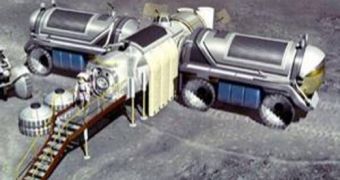The American space agency's acting administrator, Chris Scolese, told lawmakers on Wednesday that NASA would most likely not engage in efforts of constructing a permanent scientific base on the Moon. The official's statements left to be understood that the agency would rather orient its efforts towards missions to Mars, or maybe even on near-Earth asteroids, such as Vesta. The Ceres dwarf planet could also be included in the space exploration program, as could several of Jupiter's and Saturn's moons, such as Europa, Titan and Enceladus. The statements came as a blow to the astronautic community, which expected the US agency to spearhead the efforts for a permanent lunar base.
“We were looking at an outpost on the moon, as the basis for that [2020] estimate and that one is being revisited. It will probably be less than an outpost on the moon, but where it fits between sorties, single trips, to the moon to various parts and an outpost is really going to be dependent on the studies that we're going to be doing. Recall the Vision was not just to go to the moon as it was in Apollo, it was to utilize space to go on to Mars and to go to other places. We've demonstrated over the last several years that with multiple flights we can build a very complex system reliably – the space station – involving multiple nations, and we'll need something like that if we're going to go to Mars,” Scolese said.
“So what I would like to see from NASA over time is an architecture that…will give us flexibility for taking humans beyond low-Earth orbit and allowing us to have options for what we can do at the moon as well as other destinations (...) Mars or an asteroid (...) so that there are options on what we do in 2020,” he told the Subcommittee on Commerce, Justice, Science, and Related Agencies of the House Committee on Appropriations. However, the acting administrator's deposition left the chairman of the subcommittee in the dark, NewScientist reports.
“Does the 2010 budget request impact in any way our target – is this so complicated – our target of getting to the moon by 2020? Is there any consideration being given within the organisation to not attempting to meet the 2020 moon [deadline]? Is there any reconsideration of going there? What is going on here?” congressman Alan Mollohan asked. NASA's Associate Administrator for Exploration Systems, Doug Cooke, replied that no changes in the agency's schedule had yet been made, but that experts were still analyzing the impact of the 2010 budget on the 2020 objectives.
Over the last few years, NASA has accelerated its efforts of returning astronauts to the Moon, and has since set 2020 as the year in which this objective is to come true at last. For this very end, the agency has funded the Constellation Project, aimed at providing the US with a versatile launch delivery system array, as well as with two crew vehicles, able to take people to the Moon or even to Mars. The array includes the Orion Crew Exploration Vehicle rocket, ARES I, as well as the ultra-heavy ARES V lift system, able to deliver more than a hundred metric tons of cargo to orbit.

 14 DAY TRIAL //
14 DAY TRIAL //